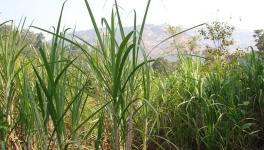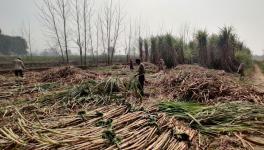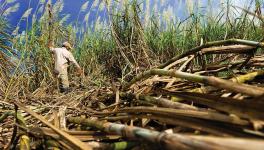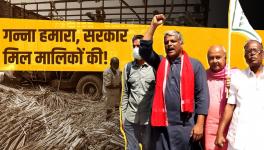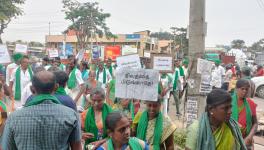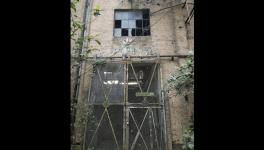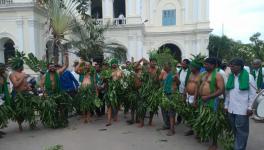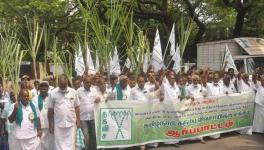Why Anti-India Complaints in WTO on Sugar Subsidy May Remain Unresolved
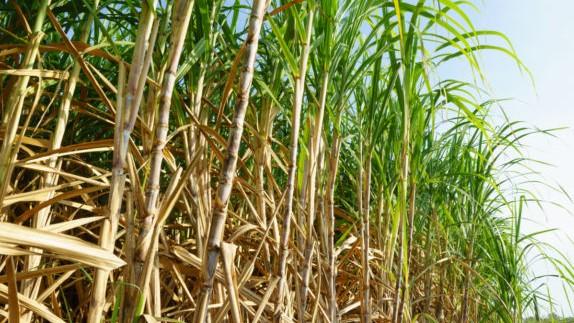
Representational image.
Kolkata: Under fortuitous circumstances, the complaints lodged by Brazil, Australia and Guatemala with the World Trade Organisation (WTO) against India’s policy of subsidising sugarcane growers and mills is likely to remain indefinitely unresolved.
The action of the three countries has been causing serious concern to Indian farmers’ organisations as, in their assessment, an adverse WTO verdict can jeopardise the livelihoods of almost five crore sugarcane farmers and their dependants.
In addition, uncertainties of sugarcane supplies will impact the functioning of sugar mills, which engage about five lakh workers. In addition, there are thousands who earn their livelihood from a host of ancillary activities, including transportation.
The outfits, which work to safeguard the interests of farmers under the aegis of the New Delhi-based Indian Coordination Committee of Farmers Movements (ICCFM), have been urging the Union government to persuade the three countries to withdraw the complaint. It may be mentioned that in addition to the three countries which have directly moved WTO, several other countries have “reserved their third-party rights” and thereby have lent strength to the complaints.
The complaints can be summed up thus: India’s sugar subsidy regime is inconsistent with the WTO rules and has helped create a situation of oversupply in the global sugar market. It has cited the increase in India’s Fair and Remunerative Price (FRP) mechanism to Rs 2,750 per tonne of sugarcane from Rs 1,390.20 in 2010-11 and pointed out that some states pay what is called State Advised Price (SAP), which is higher than FRP.
Therefore, the total assistance provided through multiple programmes exceeds 10% of the value of production permitted under WTO rules. This is depressing international sugar prices and, therefore, hurting the interest of sugarcane growers and millers in their countries. They are left with no choice but to formally initiate WTO dispute action against India’s subsidy policies.
Brazil has contended that it is the world’s number one sugar producer and exporter and sugarcane cultivation has a vital share in that country’s agri-economy. Australia has argued that it ships out the bulk of its raw sugar production and the milling sector employs about 40,000 workers. Therefore, prospects for sugarcane and sugar have a bearing on its economy. Guatemala, a Central American country, has argued that it has an export-oriented sugar economy and the depressed world price situation resulting from India’s higher sugar production facilitated by its subsidy regime is affecting its export earnings.
ICCFM has refuted these arguments of the three countries. In a representation addressed to Prime Minister Narendra Modi, national secretary of Bharatiya Kisan Union and ICCFM, Yudhvir Singh has said that the FRP mechanism in vogue in India for the several years is “intended to prevent sugarcane farmers from being exploited and helps them to receive a fair price from sugar mills”. Brazil’s claim of the support being much more than admissible under WTO rules, is absolutely false, he said.
India is the second largest producer of sugarcane and sugar and what is being missed by the complainants is that India has a very large sugar consumption base, given its huge population and the people’s strong liking for tea and coffee, a whole range of cold drinks as also sweets and confectionaries. Therefore, it is imperative for India to take steps to increase production to be able to meet domestic demand.
India’s sugar sector is not geared toward exports, which constitute hardly 3-4% of its production. Also, before allowing exports, the government makes sure that domestic supplies are not impacted. It’s really a domestic consumption story.
The complainants also have ignored the fact that often cane payment arrears add up to thousands of crores of rupees and sugarcane farmers have to contend with the financial crisis. Their aim seems to be to see that India’s sugarcane and sugar output falls drastically and it is forced to resort to imports, Singh argued.
The representation to the Prime Minister points to “deep-seated structural and systemic issues with the way WTO has been created/ rigged. It is founded on a totally asymmetrical playing field where the rules are disadvantageous to developing countries like India”. For example, India cannot provide product-specific support over 10% of the total value of production of a particular product and can be penalised if it breached the 10% cap while trying to help its farmers when in crisis.
On the other side, the US, the European Union and Canada can give out huge subsidies and they have provisions to concentrate all their subsidies on just one product to give trade advantage to their own product, if they like.
This was possible because at the time WTO was negotiated, developed countries and some developing countries got away by negotiating huge entitlements called Aggregate Measurement of Support, which are the subsidies that they can apply while developing countries were stuck with the 10% limit, ICCFM has observed. The Union government should, therefore, rethink about trade under WTO and demand agriculture be taken out of the purview of WTO.
In their submissions, inconsistencies have been pointed out under Domestic Support Measures (Articles 3.2, 6.3 and 7.2 (b) of Agreement on Agriculture). Also, inconsistencies have been recorded under Export Subsidy Measures (Articles 3.3, 8, 9.1 and 10.1 of Agreement on Agriculture).
It all started about a year ago, to be precise February 27, 2019. WTO’s Dispute Settlement Body (DSB) set up a panel on August 15, 2019, to examine the complaints against India and on October 28, 2019, composition of the panel was announced.
What are the fortuitous circumstances under which the dispute between the three countries and India may remain unresolved indefinitely?
As knowledgeable quarters explained to NewsClick, under the rules, WTO’s appellate body has to have seven members (judges) to be appointed by DSB on four-year terms. After the retirement of four members, only three members were continuing. In recent times, two more members have retired, leaving only one functioning member.
Under the rules, if the strength of DSB drops to two, the appellate body cannot operate, as each case requires at least three sitting members. The stalemate can be traced to the US blocking appointment of judges for over two years, arguing that the DSB is ignoring the rules set by WTO members.
Sources NewsClick spoke to say one way out for India to end the uncertainties is to use its diplomatic skills and persuade Brazil, Australia and Guatemala to withdraw their complaints. A window of opportunity to do so is available, as both Brazil and Australia have acknowledged that they have good relations with India but have sought WTO’s intervention under compelling trade reasons. Guatemala is silent on its ties with India and seems to prefer WTO action.
As the situation stands now, only the US can facilitate filling up of judges’ vacancies and normal functioning of the appellate body.
The writer is an independent journalist based in Kolkata.
Get the latest reports & analysis with people's perspective on Protests, movements & deep analytical videos, discussions of the current affairs in your Telegram app. Subscribe to NewsClick's Telegram channel & get Real-Time updates on stories, as they get published on our website.










